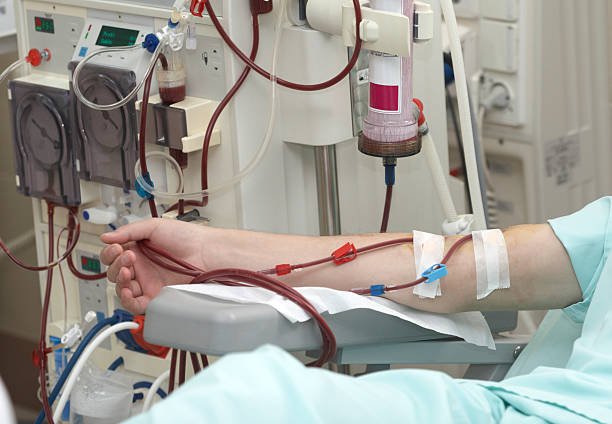
Does a 30-year-old Dialysis Patient Have the Heart of an 80-Year-old? Beware of “Cardiorenal Syndrome”! Pay Attention to These 2 Points to Prevent Heart Failure
Over 30,000 people in the UK are currently on dialysis. Among the deaths, 50% are accompanied by heart failure; on the other hand, about half of the patients with heart failure suffer from chronic renal failure. The heart and kidneys are closely connected, and as long as one of them is damaged, the other will also be affected.
We explain to you the connection between the heart and kidneys. Why does kidney dialysis cause heart failure? Why are heart failure patients prone to chronic renal failure? It also explains the symptoms that dialysis patients need to pay attention to for heart failure, as well as the key points of heart failure treatment.
Heart and kidneys are related, be careful of the vicious cycle of “cardiorenal syndrome”
Cardiorenal syndrome refers to kidney disease caused by insufficient blood supply to the kidneys due to primary heart disease, or due to primary kidney disease, such as chronic renal failure, resulting in an imbalance of body fluids and electrolytes, thereby increasing the burden on the heart and causing heart failure. Cardiorenal syndrome is a bidirectional disease. When one organ is damaged, the other one will be dragged down, falling into a vicious cycle that gets worse and worse.
Regarding the relationship between the heart and kidneys, the five major organs of the human body, including the heart, liver, spleen, lungs and kidneys, are connected to each other, among which the heart and kidneys are particularly related. 1/4 of the blood output by the heart is sent to the kidneys. When the heart function is damaged, the blood transfusion volume of the kidneys will be reduced, leading to a decline in kidney function. On the contrary, when the kidney function is abnormal, the body will have the following 4 symptoms: problems that increase the burden on the heart:
- Water accumulation and increased blood pressure
- Electrolyte or calcium and phosphorus imbalance affects the elasticity of the heart and blood vessels.
- The lack of oxygen in the blood due to anemia requires the heart to work twice as hard to increase the oxygen content in the blood.
- The kidneys’ ability to eliminate toxins and harmful substances becomes poor, which impairs cardiovascular function.
According to the causal relationship between acute and chronic lesions and cardiorenal effects, cardiorenal syndromes can be divided into five types. In clinical practice, patients often have high blood pressure at first, but later it is poorly controlled, causing damage to the heart and kidney functions. It can be seen that the heart and kidneys are closely related and influence each other. For disease control, we should also seek cross-team care from heart and kidney doctors.

How can dialysis patients prevent heart failure?
People commonly use the three major symptoms of “tiredness, breathlessness, and swelling” to judge heart failure. This is suitable for general patients and patients with heart disease, but it is less suitable for dialysis patients. Because kidney dialysis will eliminate excess water, it is not easy to breath and swell. Dialysis patients are inherently prone to fatigue, so they cannot be used as a criterion for early detection.
If a dialysis patient experiences symptoms such as tiredness, breathlessness, and swelling, he or she is usually severely damaged. The best approach is as follows:
- Regularly receive cardiac ultrasound or chest X-ray examination every year to check the function and structure of the heart
- Pay attention to whether your blood pressure often drops during dialysis. If your blood pressure drops after dialysis every week or every two weeks, you should arrange a heart checkup to confirm whether your heart function is abnormal.
In addition, if dialysis patients experience the following conditions, they may have developed heart failure, and it is recommended that they be examined and treated as soon as possible:
- It is easy to breathe when lying down, but it is not possible to breathe when sitting upright: Abnormal heart function can lead to water accumulation in the lungs. When lying down, the water will fill the lungs, making people breathless; when sitting upright, the upper part of the lungs does not need to be soaked in water. , the respiratory function is better; it is an obvious basis for judging heart failure.
- Decreased motor function when walking or climbing stairs: This refers to tired and swollen breathing. Although there is no edema, it is easy to have breathing from time to time. It is also an important indicator of heart failure.

Three key points in treating heart failure for dialysis patients
The focus of treating heart failure is to break the vicious cycle of the heart and kidneys, which can be divided into three parts:
- Maintain good dialysis frequency and efficiency: Avoid increased burden on the cardiovascular system due to accumulation of water and toxins.
- Control the three highs: Avoid rising blood pressure, blood lipids or blood sugar, which may worsen heart failure.
- Treatment of heart problems: Some dialysis patients often suffer from arrhythmia or coronary heart disease, so they need to use electrocautery, drugs or a pacemaker to improve the arrhythmia, or use basic dilation and stents to treat coronary artery stenosis to improve heart function. If the heart structure and function have not improved after treatment, there are some new heart failure drugs recently, and clinical studies have shown that they have significant effects on improving the heart structure and clinical symptoms.
In addition to receiving treatment for heart failure, it is also important to properly control diet, blood sugar and blood pressure. Clinically, it is common for dialysis patients aged 20 to 40 to have an 80-year-old heart at the age of 30 because they consider themselves young and do not care about their diet and physical condition. Heart failure has a high mortality rate regardless of age. Therefore, if you receive treatment when your heart function is severely damaged, even if you are young, it will be difficult to return to a healthy state. Young dialysis patients should not be cautious.












